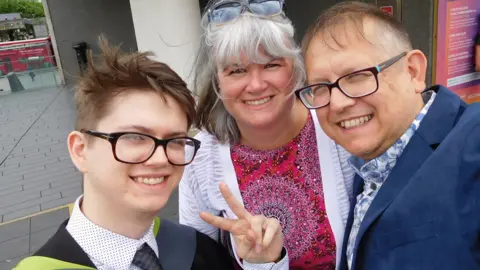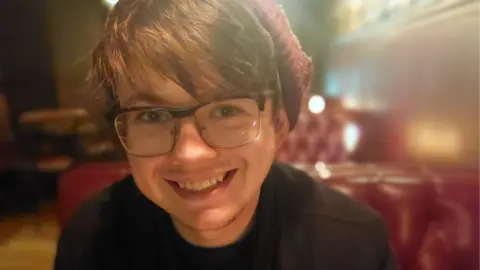Couple's campaign for more funding for brain tumour research
 Amess family
Amess familyA couple whose son died days after a brain tumour diagnosis are campaigning for more money to be spent on research.
Oliver Amess, 26, from Droitwich in Worcestershire, died in January 2022.
"There seems to be money invested in other conditions and cancers however brain tumours are at the bottom of the pile," Robin Amess said.
Brain Tumour Research said less than £11m has been spent on research over the past five years.
Mr Amess, 56, said their only child had been working as a dental technician and was a founding member of a computer gamers company after graduating from university.
They first realised something was wrong when Oliver returned home a day early from his girlfriend's house and said he had been "talking nonsense at the dinner table the evening before and had been vomiting all night."
 Amess family
Amess familyHe was taken to hospital the following day, 8 January 2022, after suffering a suspected stroke. A glioblastoma was found on his brain stem.
The tumour's location meant that removal of the mass was too risky and his body would not have coped with chemotherapy. He died on 28 January.
"It was just so quick, we were just living in a nightmare really," his mother Wendy Amess said.
"We basically kissed him goodbye and said we loved him in the ambulance at Worcester and that was the last time we spoke to him and were able to communicate," his father added.
 Amess family
Amess familyMr and Mrs Amess are now supporting a Brain Tumour Research campaign to collect 100,000 signatures to increase research funding, in the hope of prompting a parliamentary debate.
The charity wants the government to ring-fence £110m for brain tumour research, with the aim of increasing national spending on the work to increase to £35m a year between now and 2028.It said this would bring it in line with spending on research for cancers of breast, bowel and lung, as well as leukaemia.
The government said it has allocated £40m for brain tumour research and the £10.7m handed out from that pot so far has supported 13 research programmes.
It said it is "investing in infrastructure, workshops for researchers and training for clinicians" to encourage further applications.

Follow BBC West Midlands on Facebook, Twitter and Instagram. Send your story ideas to: [email protected]
